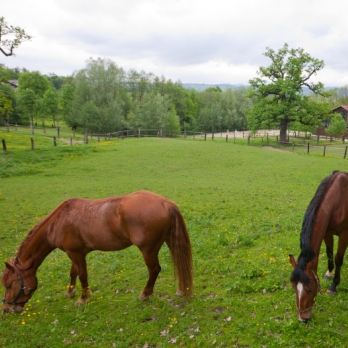This is a question that the courts have struggled with, in particular when dealing with injunctions against travellers and protesters, where the composition of the groups involved changes from time to time.
The Supreme Court in Wolverhampton City Council & others v London Gypsies & Travellers & others [2023] has finally resolved the issue, finding that the court does have the power to grant injunctions against newcomers, but for very different reasons than previously thought.
Injunctions
An injunction is a court order that requires a party to do something or to stop doing something.
It is a discretionary remedy. The court will only grant an injunction if it considers it just and convenient to do so.
It is considered that the court has an unlimited power to grant an injunction although it will only do so in accordance with settled principles.
Injunctions can be granted on an “interim” or “final” basis. It is possible, therefore, to obtain an interim injunction on an urgent, but temporary, basis until the court is able to fully consider matters at trial where it will decide whether the injunction should continue permanently.
Development of injunctions against “persons unknown”
The general rule is that you can only get an injunction against someone where they are a party to an underlying legal claim, and you can only start an underlying legal claim where you can name the defendant and serve the proceedings on them.
The general rule is not, however, absolute.
A number of exceptions have been created over time.
The law has, for example, evolved so that it is possible to obtain injunctions against people whose identities are not known (“persons unknown”).
Injunctions have, in this way, been granted against representative defendants, but with other unnamed people being described in general terms, and the order binds both the named and unnamed defendants.
In appropriate cases, the courts have even been prepared to grant orders that apply to everyone in the world (such as to prevent the publication of confidential information to protect an individual’s human rights, or prohibit the publication of information about court proceedings).
The courts have, more recently, been prepared to grant injunctions against entities where there is no underlying legal claim against them at all. A modern example is an internet blocking order, where an innocent internet service provider can be ordered to block a wrongdoer’s website that is selling counterfeit goods.
In relation to service, the courts have been prepared to allow injunctions to be served by alternative methods (such as via social media) where traditional methods may not be available or work.
One area where the law around injunctions against persons unknown has had particular focus, is where travellers have gone onto land without permission. The difficulties in being able to identify particular defendants, and how to serve court documents on them, are quickly apparent in this context.
Development of newcomer injunctions
In its judgment in Wolverhampton, the Supreme Court set out the development of injunctions against the traveller and gypsy community over the last 20 years.
Previously, local authorities would name particular individuals they had been able to identify who were unlawfully occupying land and would, in addition, seek relief against “persons unknown” who would be identified by some form of description.
In time, local authorities would bring claims simply against persons unknown.
In due course, local authorities targeted not just those who were actually occupying land (whether known or not), but those who might occupy land.
Such orders were therefore not against people who were actually doing something wrong, or even threatening to do so, but against unknown people who might potentially do something unlawful in the future.
These types of injunction have a significant impact on the communities of travellers and gypsies against whom they are directed, forcing them out of the boroughs that obtained them.
The courts have therefore faced the challenging job of trying to balance the recognised rights of the gypsy and traveller community to pursue a nomadic lifestyle, against the public interest.
The courts have, however, been prepared to grant such injunctions, prohibiting travellers from trespassing on land where they have not at that time even threatened to do anything wrong, where those people could not be identified, had not been served and were not party to any underlying legal claim at that date.
Until now, the precise basis on which such orders have been made has, however, been unclear, with disagreement in the lower courts.
Wolverhampton
In this case, several local authorities sought injunctions against persons unknown that prohibited unauthorised encampments in their boroughs. The injunctions sought to restrain an actual or threatened breach of planning control or trespass.
The injunctions were sometimes addressed to “persons unknown” and in other cases to persons described by reference to the activities they were prevented from engaging in (for example, from entering or remaining on specified land without planning permission).
In most cases, the local authorities obtained orders allowing service of the claim and injunction by alternative methods, usually by fixing copies in a prominent location at each site.
Some injunctions were of a fixed duration; others had no specified end date.
Some were interim injunctions; others were final injunctions.
From mid-2020, some of the local authorities applied to extend or vary some of the time-limited injunctions.
The High Court judge who initially heard the applications thought that there was a need for a wider review of newcomer injunctions.
The High Court held that, whilst interim injunctions could be granted against persons unknown, final injunctions could only be granted against parties who had been identified and had had an opportunity to contest the final order. The local authorities appealed to the Court of Appeal.
The Court of Appeal decided that the High Court was wrong to say that final injunctions could not bind persons unknown. Rather, the Court of Appeal concluded that an injunction could describe the defendant by reference to the prohibited behaviour and that people, including newcomers, then became parties if they breached the injunction.
The Supreme Court considered the Court of Appeal’s reasoning to be unsatisfactory, mainly because it was based on the premise that the injunction would be breached and took no account of the people who would obey it. It also involved the paradox that a person would only become bound by an injunction as a result of breaching it.
Instead, the Supreme Court decided that, whilst having some similarities with previous categories of injunction, newcomer injunctions are in fact a new type of injunction.
The Supreme Court found that there were several distinguishing features of newcomer injunctions.
For example, they are made against people who are genuinely unknowable and therefore apply potentially to anyone in the world; they are always made without having given formal notice; and they are typically made where those targeted are unlikely to have any right to do the prohibited act (to trespass on land or breach planning control), so there is unlikely to be a real dispute to resolve. Newcomers are unlikely to engage with the court process, and conventional injunctions are inadequate in this type of situation, where the conduct might stop only to start again by different individuals or on a nearby site.
The Supreme Court concluded that:
- The court has the power to grant an injunction against newcomers either on an interim or final basis (the court considered the distinction to be unhelpful in this context), which will necessarily be made without giving formal notice.
- A newcomer injunction is essentially an order made against the whole world. It will bind anyone who has notice of it while it remains in force, even though that person had no intention and had made no threat to do the prohibited act and against whom the applicant had no legal claim.
- In deciding whether to grant a newcomer injunction, the court will be guided by established equitable principles. The court will take a flexible approach and won’t be constrained by hard rules or procedure if it needs to devise a remedy to suit new circumstances.
- Demonstrate a compelling need for the protection of civil rights or the enforcement of public law not adequately met by any other remedies. They must show that they have properly considered the provision of lawful stopping places for gypsies and travellers, engaged in dialogue to try to accommodate their nomadic lifestyle and taken steps to use other powers to address unauthorised encampments.
- Build-in procedural protections for newcomers affected by the order, given that they won’t have received formal notice. The application may need to be advertised; newcomers should be able to vary or discharge the order; and the injunction will likely need to be limited in time and geographic scope.
- Ensure they give full and frank disclosure.
- Show that it is just and convenient that the injunction should be made.
This decision provides much needed clarification of the basis on, and circumstances in, which local authorities and private landowners may be able to obtain injunctions against changing groups of travellers.
It is, however, much more significant than that.
The case will also be of considerable relevance to other situations in which it may not be possible identify wrongdoers and where newcomers may join later on. The Supreme Court gave the example of injunctions against environmental protesters, industrial disputes and online intellectual property and social media-related activities, but there will be others.
Perhaps more importantly, the judgment shows that, whilst the courts may not move as quickly as some might like, they can and will react to changing circumstances. This may encourage the development of new types of injunctions in the future. Showing a preparedness to adapt and find new solutions for new problems may be particularly important as we enter the age of generative AI.




